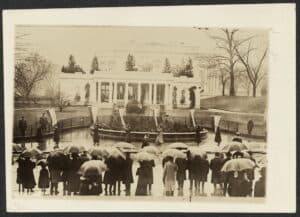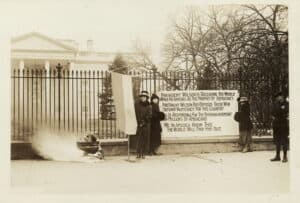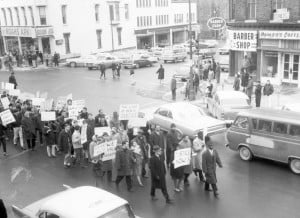When You Can’t Find The Words
by Kerry Lippincott, Executive Directors
A global pandemic. Millions out of work. Protests across the country calling for racial and social justice. What times we are living in. Since there is nothing in my living memory that I can even try to compare current events to, I have to turn to history. particular Alice Paul and the National Women’s Party come to mind.

Members of the National Woman’s Party picketing the White House on March 4, 1917. Courtesy of The Library of Congress
While studying and doing social work in England, Alice Paul learned firsthand the confrontational tactics and civil disobedience used by the militant wing of the British suffrage movement. She participated in demonstrations and was jailed for her suffrage activities. Upon her return to the United States in 1910, Paul pressed the National American Woman Suffrage Association to adopt approaches like those used in England and advocated for focusing solely on the passage of federal suffrage amendment. Her belief in the need to attract publicity and keep suffrage visible in the public eye, as well as her determination not to shy away from confrontation and her focus on a federal amendment led to a break with the National Association in February 1914. Through her own organization, the National Woman’s Party (NWP), Paul devised strategy after strategy to keep suffrage in the headlines and in front of President Wilson and Congress from 1914 to 1919.

A National Woman’s Party “watchfire” outside of the White House, January 1919. Image courtesy of The Library of Congress.
As the United States entered World War I and the Spanish Flu began its grip on the country, the NWP picketed the White House and held vigils at Lafayette Park, the Capital and Senate Office Building. Overall between January 10, 1917 and March 4, 1919 over 2,000 women participated in the NWP’s nonviolent protests, 500 were arrested and 168 served time in jail. The women were arrested for obstructing traffic (they were on sidewalks), holding a meeting on public grounds or building fires in a public space (fires were burned in urns at 24 hour stretches at the White House and speeches by President Wilson were often burned). The sentences ranged from a $25 fine (which the women refused to pay) or three days in jail, to a 30 day to 6 month prison sentence. Once imprisoned many women were forced fed when they went on hunger strikes to protest being denied political prisoner status.
Earlier this week as events kept unfolding, I felt the Historical Society had to say something. Yet, I struggled to find the words. So I found someone else’s words. Over our social media channels the statement from Smithsonian Secretary Lonnie G. Bunch was shared. The statement is below in its entirety.
Like many Americans, watching multiple incidents of deadly violence against black people unfold before our eyes has left us feeling demoralized and distraught, aghast and angry. Not only have we been forced to grapple with the impact of a global pandemic, we have been forced to confront the reality that, despite gains made in the past fifty years, we are still a nation riven by inequality and racial division. The state of our democracy feels fragile and precarious.

Marchers in support of Civil Rights Movement in the south march through downtown Geneva in 1965.
Once again, we struggle to make sense of the senseless. Once again, we bear witness to our country’s troubled history of racial violence, from Freddie Gray and Eric Garner to Sandra Bland and Trayvon Martin. Once again, we try to cope as best as we can, whether suffering in silence, participating in protests, or engaging in conversations that evoke all of our emotions. Once again, we try to explain to our children that which cannot be explained. Once again, we pray for justice and we pray for peace. Once again.
We express our deepest sympathy to the families and communities of George Floyd, Ahmaud Arbery, Breonna Taylor, Tony McDade, and the far too many preceding them whose needless deaths were brought about by unjustified violence. We hope that their pain and sorrow compel America to confront its tortured racial past, and that this moment becomes the impetus for our nation to address racism and social inequities in earnest.
Although it will be a monumental task, the past is replete with examples of ordinary people working together to overcome seemingly insurmountable challenges. History is a guide to a better future and demonstrates that we can become a better society—but only if we collectively demand it from each other and from the institutions responsible for administering justice.
Frederick Douglass famously said, “Those who profess to favor freedom and yet depreciate agitation, are people who want crops without ploughing the ground….The struggle may be a moral one, or it may be a physical one, or it may be both. But it must be a struggle.” At this pivotal moment when the eyes of the nation and the world are upon Minneapolis, will we join the struggle to seek justice and equality? Will we heed the call of courageous figures throughout history who spoke out against slavery, marched on for voting rights, and sat in for basic equality? Will we challenge the nation to live up to its founding ideals? In the memory of those taken from us and for the good of the country, I hope that we do.

Kerry, thank you, yet again for finding the right words.